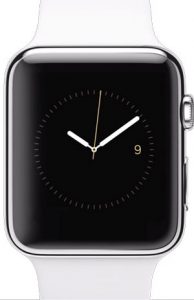

Some believe that wearables – smartwatches and other devices that can measure a multitude of physiological parameters – are going to be one of the next big things in medicine.
‘
If a recent Stanford study is any indication, they may just well be. Check out the blossoming world of wearables and how they might be used to stop flares or crashes before they are get out of control in
Wearables – A Next Big Thing for ME/CFS and Fibromyalgia?
<







Regarding medical device trackers, I have used Acti-Graph wrist trackers prescribed by sleep labs in the past. The Actigraph has a great computer interface that prints out a lovely 2 week bar graph of your sleep and circadian rhythm. (I was impressed that the sleep logs I recorded manually each morning on a graph paper matched the actigraph data almost exactly.)
Last year, I tried to buy an Actigraph to track my completely chaotic circadian rhythm (sleep cycle) myself. The company told me that since it’s a medical device they can not even sell it to anyone who isn’t an MD.
So I got a Fitbit Charge instead. I researched trackers before choosing this one and the Fitbit “dashboard” displays tracked sleep in a nice color-coded bar graph showing which hours of the day or night you’re asleep, restless, napping or awake, with 7 days all lined up for easy comparison (very similar to the Actigraph printout).
The Fitbit website claimed something to the effect that “all the data is yours, you own it and can download all of your daily steps, calories, etc. into a spreadsheet and do whatever you want with it”.
However, I discovered too late that the only sleep data that can be downloaded is the hour and minute that you fell asleep and woke up (once per day). There is no sleep bar graph available to download, even if you pay the extra undisclosed annual $50 fee to be able to download “your” extra data. The only way to keep track of the circadian rhythm is to print out a hard copy of the Dashboard when you sync to the computer, at least once a week.
Occasionally days of sleep data will just be completely missing from the dashboard display.
Riding in a car is often recorded as running or walking many steps, not sitting or sleeping). The tracker also isn’t smart enough to know when it’s plugged into the computer for recharging; instead it records it as a nap.
For an item costing over $100, I was very disappointed that my band wore out in less than a year and the battery was no longer holding much charge. Especially since I’m so sedentary – I have CFS & Lyme, for crying out loud – I rarely reached 10K steps per day! An active athlete’s might last a month!
Fortunately Customer Service was excellent and they promptly replaced my tracker with a new model (the Charge was discontinued).
Overall the Fitbit is a nice “toy”, but it’s not a very robust medical device tracker for those of us with a serious medical issue.
If anyone has used another brand or model that works well for sleep tracking, please let me know.
And Thanks Cort for your excellent info – always amazing!